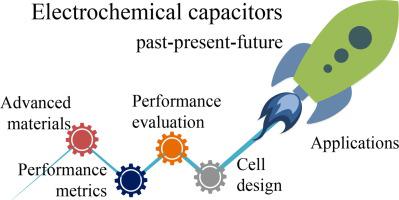Journal of Energy Chemistry ( IF 14.0 ) Pub Date : 2020-11-18 , DOI: 10.1016/j.jechem.2020.11.013 Jingyuan Zhao , Andrew F. Burke

|
The development of electrochemical capacitors (i.e. supercapacitors) have attracted a lot of attention in recent years because of the increasing demand for efficient, high-power energy storage. Electrochemical capacitors (ECs) are particularly attractive for transportation and renewable energy generation applications, taking advantage of their superior power capability and outstanding cycle life. Over the past decade, various advanced electrode materials and cell design are being studied to improve the energy density of ECs. Hybrid Li-ion capacitors and pseudo-capacitors that utilize fast surface redox reactions of metal oxide and doped polymers are the prime candidates being considered. This paper is concerned with the metrics being used to describe the performance of ECs and how the metrics are evaluated by testing devices and how the data from the testing are best interpreted. Emphasize is on relating testing of advanced ECs using materials more complex than activated carbons to testing electric double-layer capacitors (EDLCs) using carbon in both electrodes. A second focus of the paper is projecting the potential of the advanced materials and ionic liquid electrolytes for the development of complete EC cells having an energy density more than a factor of ten greater the energy density of the EDLC devices currently on the market. This potential was evaluated by calculating the performance (energy and power) of a series of ECs that utilize the advanced materials that have been studied by electrochemists over the past 10–15 years. The capacitance and resistance of the advanced ECs were calculated utilizing specific capacitance (F/g or F/cm3) and porosity data for the electrode materials and ionic conductivity of the electrolytes. It was concluded that hybrid ECs can be developed with energy densities of at least 50 Wh/kg, 70 Wh/L with efficient power greater than 3 kW/kg. Continued research on micro-porous carbons with specific capacitance of 200F/g and greater is needed.to achieve these EC performance goals.
中文翻译:

超级电容器评论:技术和性能评估
近年来,由于对高效,高功率储能的需求不断增长,电化学电容器(即超级电容器)的发展引起了很多关注。电化学电容器(EC)凭借其卓越的功率能力和出色的循环寿命,特别适合运输和可再生能源发电应用。在过去的十年中,正在研究各种先进的电极材料和电池设计,以提高EC的能量密度。利用金属氧化物和掺杂聚合物的快速表面氧化还原反应的混合锂离子电容器和伪电容器是考虑的主要候选对象。本文关注的是用于描述EC性能的指标,以及测试设备如何评估这些指标以及如何最好地解释测试数据。重点是将使用比活性炭更复杂的材料对高级EC进行的测试与在两个电极中均使用碳的双电层电容器(EDLC)的测试相关联。本文的第二个重点是预测先进材料和离子液体电解质在开发完整EC电池方面的潜力,该电池的能量密度比目前市场上EDLC器件的能量密度大十倍。通过计算一系列EC的性能(能量和功率)来评估这种潜力,这些EC使用了过去10-15年中电化学家研究的先进材料。先进EC的电容和电阻是使用比电容(F / g或F / cm3)和电极材料的孔隙率数据以及电解质的离子电导率。结论是,可以开发出能量密度至少为50 Wh / kg,70 Wh / L,有效功率大于3 kW / kg的混合EC。为了实现这些EC性能目标,需要继续研究比电容为200F / g或更大的微孔碳。











































 京公网安备 11010802027423号
京公网安备 11010802027423号